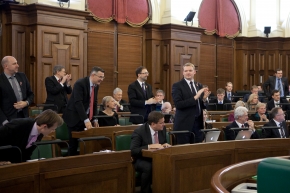 VideoGalerie
VideoGalerie
On Thursday, 15 November, the Saeima adopted in the final reading the Law on Medium-Term Budget Framework for 2013–2015, the Law on the State Budget for 2013, as well as amendments to 25 budget-related laws. This is the first time in the history of the Saeima that it adopts a law multi-annual budget.
The Law on Medium-Term Budget Framework for 2013–2015 was adopted with 55 votes for and 38 votes against, and the Law on the State Budget for 2013 was adopted with the same distribution of votes.
“It is significant that since the drastic budget cuts of 2008, the state budget adopted by the Saeima today is the first budget which envisages an increase in the budget expenditures in several budget positions. Furthermore, the medium-term budget framework, which was adopted for the first time in the history of the parliament, defines priorities for which additional funds were allocated already today. These priorities include demographic improvement, economic growth and increase of salaries for people employed in the public sector,” said Jānis Reirs, Chairman of the Budget and Finance (Taxation) Committee of the Saeima, which is responsible for the passage of the budget-related draft laws.
“70 million lats will be allocated for addressing problems related to the demographic situation; 45 million lats are earmarked for ensuring health-care services. Significant funds will be made available for investments in road construction and repair, infrastructure, as well as implementation of Latvia’s foreign policy. Additional funds are also allocated for team sports and implementation of local-government projects. Finally in 2013, salaries will be increased for persons employed in the public sector, including teachers, staff members of the Ministry of the Interior and its subordinate agencies, courts and the Prosecutor’s Office. It is also possible to allocate financial resources for bonuses, which is one of the ways to prevent brain drain from public administration,” emphasised Reirs.
The Law on Medium-Term Budget Framework had to be adopted in order to achieve the goals set forth in the National Development Plan and to ensure compliance of the annual state budget with mid-term plans. The Law on Medium-Term Budget Framework contains key macroeconomic and financial indicators, including goals of the medium-term budget, total balance of payments of the state budget, as well as the maximum amount of permissible budget expenditure.
The budget deficit calculated according to the European System of Accounts 1995 (ESA 95) methodology is expected to be 1.4% of GDP in 2013, 0.8% of GDP in 2014, and 0.3% of GDP in 2015.
The state budget for 2013 was drawn up on the assumption that GDP growth in 2013 will be 3.7%, and today the Saeima supported allocation of additional funding for several priority budget positions.
With the aim to improve the demographic situation, limits set for parental, maternal and paternal benefits will be lowered. Statutory state social insurance instalments for persons on child-care leave and for persons taking care of their children under 1.5 years of age will also be increased from 50 to 100 lats. As of next year, the minimum parental benefit will be increased from 63 lats to 100 lats, while child-care benefit for a child up to 1 year of age will be 100 lats without discriminating between parents who have had and who have not had social insurance.
During the next two years, family state benefit will remain in the amount of 8 lats for each child; however, as of 2015 it is planned to differentiate this benefit by taking into account the number of children raised by the family.
Additional funding will be allocated to reduce waiting queues for a place in municipal nurseries, and a monthly benefit of 100 lats will be granted to parents whose children, though older than 1.5 years of age, are not provided with a place in the municipal nursery. Furthermore, funding is allocated for provision of free meals not only to first-grade students but also to second-grade students.
Real estate tax on a house or a flat and the pertinent land will be reduced by half but not for an amount exceeding 300 lats for families with three or more children under 18 years of age.
By 2016, it is planned that the amount of child support provided by the Maintenance Guarantee Fund, which was reduced some years ago, will be gradually increased by 5 lats annually. Measures will be introduced to ensure more efficient cross-border collection of child support and recovery of wrongly paid child support.
The personal income tax rate will be 24% in 2013, 22% in 2014, and 20% in 2015. The aim of the labour tax reform is to make sure that in competing for investments and jobs, expenditures for taxes on labour in Latvia are equal to those in Estonia and Lithuania.
Next year, the unemployment benefit will be paid for nine months regardless of the time period during which statutory state social insurance instalments have been paid for the unemployed; the rule requiring the unemployed to be registered as an employee before being granted the unemployed status will be revoked.
In 2013, the monthly non-taxable part of personal income will remain in the amount of 45 lats, and tax relief for each dependent will be 70 lats, with an additional increase to 80 lats expected as of 1 July 2013.
In the upcoming years, instalments in the state-funded pension scheme will be increased; the rate of social insurance instalments in the state-funded pension scheme is planned to be 4% in 2013 and 2014, 5% in 2015, and 6% as of 2016. Current instalment rate in the state-funded pension scheme is 2%.
Next year additional funding will be granted for hiring personal sign language interpreters and assistants for people with disabilities, as well as for increasing the availability of technical aids.
As of 2013, it is planned to raise salaries for certain groups employed in the public sector, including teachers working at institutions of general and cultural education, sports teachers, police officers, fire fighters, border guards, as well as employees of the Prison Administration, courts, Prosecutor’s Office and social care centres.
Additional funding will be available for bonuses to employees of certain public institutions whose contribution will notably facilitate reduction of the shadow economy, promote fair competition or reduce budget expenditures through efficient national debt management.
In order to intensify the fight against illegal employment, additional funding is allocated for raising the salaries of inspectors working at the State Labour Inspectorate, as well as for creating new jobs. It is planned to introduce mandatory health insurance and accident insurance for staff members of several institutions.
It is expected that bonuses granted to employees who assume additional duties, assume duties of an employee on leave or assume additional duties while a position is vacant will be increased from 20% to 30% of the monthly salary, and bonuses granted for personal contribution in fulfilment of work-related duties and high-quality performance will be increased from 20% to 30% of the monthly salary.
Additional funding is also allocated for fully restoring the capacity of the State Probation Service as of 1 March 2013. Furthermore, financial resources will be allocated for creating three positions at the National Electronic Mass Media Council in order to increase the Council’s monitoring capability, as well as for covering the copyright-related costs incurred by the Latvian Radio and for ensuring the work of a correspondent of the Latvian Radio in Brussels.
As of next year, it is planned to remove limits set for the amount of vacation leave bonuses and thus allow granting bonuses in the amount of 50% of a monthly salary instead of the current 25%. It is also planned that it will be possible to grant additional bonuses to employees in the amount of 75% of a monthly salary on the basis of the annual performance evaluation.
It is planned to continue channelling 80% of the personal income tax revenues to local government budgets and 20% of the personal income tax revenue to the state budget; furthermore, the state will give local governments a guarantee of personal income tax revenues in the full amount.
Next year, municipalities will be allowed to take loans for improvement of nursery infrastructure, as well as for increasing energy efficiency of municipal heating systems.
Funding is also allocated for compensation of losses incurred by national planning regions as a result of providing public transportation services for regional or local routes.
During next three years, additional funding will be earmarked for preparing for several major events such as Latvia’s presidency of the Council of the European Union in 2015, Riga's becoming the European Capital of Culture in 2014, the 25th National Song Festival and the 15th National Dance Festival, the 17th Baltic Student Song and Dance Festival Gaudeamus, and the 11th Song and Dance Festival of Schoolchildren. Financial resources are also earmarked for implementing the National Euro Changeover Plan.
Over next three years, financial support will be granted to the Latvian National Partisan Association, the Association of Latvian National Soldiers and the Social Fund of Latvian Olympic Athletes. Next year, funding will also be allocated for events devoted to celebrating the 25th anniversary of the Popular Front of Latvia, as well as for covering costs incurred by the Museum of the Occupation of Latvia as a result of relocating to temporary premises and mounting temporary exhibition.
Financial resources are allocated also to the Society Integration Foundation with the aim to continue organising camps for offspring of Latvians living abroad and children and youths living in Latvia.
As of next year, the stamp duty on financial claims exceeding 1501 lats will be increased in order to minimise the possibility of using the legal process as a reason for non-fulfilment of financial liabilities, to harmonise stamp duty with the value of the claim, and to prevent submission of unjustified claims.
It is expected that the Medical Treatment Risk Fund will become operational in October 2013; thus as of May 2014 patients who have suffered moral or physical harm as a result of medical treatment or whose life has been endangered during medical treatment will be able to receive compensation.
It is planned that in 2013, the consolidated budget revenues will be in the amount of LVL 5.7 billion, and expenditures in the amount of LVL 5.8 billion.
The Draft Law on the State Budget for 2013 was the first in recent years to be drawn up without supervision of international lenders; it was submitted to the Saeima on 28 September 2012.
Photos from the adoption of the state budget are available at: https://www.flickr.com/photos/saeima/sets/72157632011676933
Video from the adoption of the state budget is available at: https://www.youtube.com/watch?v=d56Jy0U0JW8&list=UUdQ1YxaZG3i7ygGCdU8mPKQ&index=1&feature=plpp_video
When using the material, please give credit to the Saeima Chancellery.
Saeima Press Service







